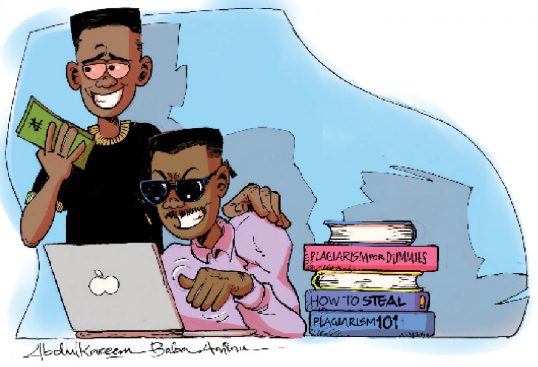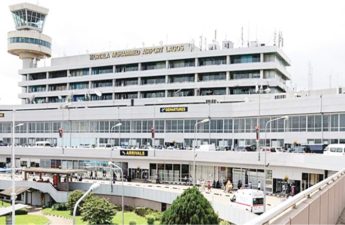It came as a shock coming across a sponsored post on Twitter from an account ‘Excellent Service Providers,’ advertising its services for students. The services included coursework, thesis, and dissertation writing, for pegged prices starting from N50,000.
A thesis, or as it is more commonly known, a final-year ‘project’, is a researched essay in the area of a students’ course of study for their degrees. For most higher institutions in the world, Nigeria included, one of the main criteria of a degree being awarded is by writing a dissertation or thesis.
But it has now become common for students to ‘outsource’ by paying individuals – sometimes referred to as ‘mercenaries’ – or even businesses specializing in writing these works. This has cast a long shadow of doubt on the credibility of the degrees, since the projects contribute a lot to the final Grade Point Average (GPA) of any potential graduate.
How it all began I saved the number on the profile of ‘Excellent Service Providers,’ sent a message on WhatsApp and introduced myself as Hassana Yahya, a Business Administration student of Nasawara State University.
Malam Ibrahim Yakasai, Director of Communications, NUC “I need help with my final year project. How do I go about?” I enquired. “Lucky, lucky you,” Ohireime Princeton Eboreime quickly replied. “My first degree and MBA are business-related,” he told me. “Send your course outline, and preferred area of concentration. We can get a topic.”
I explained to him my concerns of him running away with my money without getting the job done, to which he gave me the assurance that he wasn’t fraudulent. “I paid $400 for my sponsored post on Twitter. If I wanted to be shady, I wouldn’t use something so brain-tasking,” he said.
Eboreime was not new in the business, as he revealed to me that he had been writing theses and dissertations for the past eight years, starting when he was still at the university in the United Kingdom, for a price range of about 500 to 800 pounds sterling.
After asking me about his deadline, he told me the price for his service would cost N80,000 in two installments. 70 per cent now, and 30 per cent after the work had been completed. After bargaining for price of N50,000. We gradually settled at a price of N70,000.
“No word of this outside.
Anyone asks, you did it for 80k,” he warned me.
John Ogar, on the other hand, was very skeptical when I first introduced myself, dogging me with questions on how I got his number, and the exact person that put me in touch with him. I made up a name, and he let his guard down a little for a proper conversation, during which we discussed what I wanted, and decided seeing face-to-face would be better.
We agreed to meet in the city on a Friday, a week after our phone call. He directed me to the Area 3 junction, where he would lead me to our meeting point from there. The man who made his way towards me was well-dressed, of average height, and had an aura of overconfidence.
He also seemed cautious, almost suspicious. “John?” I asked. “Yes. Good afternoon,” he answered. “Just go straight. I’ll direct you,” giving no room for chitchat and sitting into the passenger’s seat of the car. “Where exactly are we going? I thought you would take us to your shop?” I asked cautiously, as he led us deeper into unfamiliar territory.
“It’s more of a stall where I run my business as a contractor. You don’t know Commerce Plaza? It’s inside,” he answered. When we got there, we both made our way to his “stall” in the midst of the hustle and bustle of the plaza, where printers were busy at work.
He motioned for me to take a seat, after which he also took to his, and we began to talk business. “I’ve been writing projects for over five years,” he revealed to me confidently. “It started with mine, and a friend’s own, back in school.
I’m doing really great off the money I make from my business. I’m quite comfortable,” he further revealed. “So how much am I going to pay?” I asked him. “Just give me N100,000,” he said matter-of-factly. “That’s too much,” I protested.
“The person that put me in touch with you said that you did his for N40,000.” John said times have changed, and what he was charging in 2015 is not comparable to now. “It’s not like I just write the project and that’s it. I effect all the corrections made by the supervisor myself,” he added, as he further tried to justify his price.
After drawing on about walking me through the defence and also, being available even after the project is done, John agreed to a reduced price, but with a condition: “I’ll give you a price of N70,000 if you refer your coursemates to me as well.” And with that settled, I handed him N35,000, and promised the other half of his payment after completion.
I got to meet Eboreime during our follow-up meeting. An albino, dressed in a simple orange shirt, jeans and sandals, he was on the heavier and taller side and looked quite daunting in size compared to myself. He spoke eloquently, which was attributed to his studies in the UK.
He settled in the chair beside me in the reception, looking quite at home as if we had met previously several times before. He revealed to me that over the past eight years of providing his services, he has lost count of the students he has written coursework, thesis and dissertations for.
“About 40% of my customers are Nigerian students studying for first degrees and masters degrees online, 35% are from federal and state universities, and the remaining 25% are from private universities all over Nigeria,” he boasted.
But two questions nagged: What about the institutions? Are they aware that their students engage in such acts, and still go ahead to award their degrees? I was given an answer by Amina (not real name), a student of one of the private universities in Abuja, gaining her confidence by asking her to confirm the rumours I had been hearing on the hiring of ‘mercenary’ project writers. Amina said: “I got someone who wrote my project for N60,000 for me.
But after tutoring me on how to answer the questions during defence, and also studying the project myself, two days before our projects were due for submission, when I passed my work through the plagiarism checker, it showed that the project he wrote for me was 99% plagiarized. The only thing changed was the name of the original writer, to mine.” She continued: “I ended up having to confess to my supervisor, as I only had two days before submission.
He (my supervisor) gave me three extra days to submit.
I ended up getting someone else to do the project for me. My supervisor also helped me out too, not knowing that I already had someone else helping me so that I could meet the deadline. Though I told him I didn’t do the first one myself, it didn’t affect the marks he gave me.” Asked how many students in her class also paid mercenaries, Amina answered: “Almost all of us. Very few, actually, wrote the projects themselves.”
An assessment of the projects
Dr. Theophilus Abbah, a forensic linguist, said the works are replete with outright plagiarism and careless stylistics flaws that cannot be ignored by any assessor or project supervisor worth his name. “A check on Google, not even with the use of a sophisticated plagiarism software, revealed the topic, ‘The Effect of Small Scale Businesses on the Growth of the Nigerian Economy’ was copied from a 2015 publication of the International Journal of Business and Management.” Also, the material from where the plagiarism was committed specifies the period covered in the research – 1975 to 2012.
However, the project done by the hired writer does not delimit by timeframe. Apparently, the lack of delineation is an evidence that the writer is inexperienced, as research into expected growth, or otherwise, from small and medium scale enterprises, should have a timeframe.
Incidentally, apart from the topic which was copied from the journal, there is a larger intellectual property offence committed by the hired project writer. He has copied verbatim – word for word – the contents of the journal article with all the references. He did not, in any way, make any original input. Dr. Abbah said: “It’s not only about stealing another person’s idea, or being engaged in direct or indirect textual allusion. Rather, it is a wholesale stealing of another person’s work.”
He added that a forensic stylistic examination of the work provides an instant insight into the fact that the work may never have been written by a typical undergraduate of a Nigerian university. The sentence length and the expertly control of syntax shows that the author of the original work is an expert economist.
The second research project, with the topic ‘The Effects of Small Scale Businesses/Industries in Growing the Nigerian Economy’ looks smartly produced, but replete with problems, Dr. observed.
“First, it is clear that the writer is not at home with the requirements of such projects. For instance, the font for a project is Times New Roman, and it should be 12 points. But this project has different fronts from one page to another. It gives the impression that the work was lifted from several other intellectual works produced by experts.”
“It’s like the author of the second work just lifted references from various works and slammed them onto the page, thinking no one would detect the shoddy job,” Dr. Abbah explained.
The implication on the educational system
In recent times, the quality of projects and its effects on the present generation of graduates has come under scrutiny. In a November 2018 report published by Daily Trust, a former executive secretary of the National Universities Commission (NUC), Prof. Peter Okebukola, stated that over 60 per cent of projects done by Nigerian university students are plagiarized. Earlier in 2018, a specialist in Development Economics, Dr. Bongo Adi, also stated that 70% of Nigerian graduates were “unemployable,” despite the increase in the number of graduates who were awarded first class degrees in 2017.
Also, according to a report on the Committee of Vice-Chancellors of Nigerian Universities website, the umbrella organization of vice chancellors in Nigerian federal, state and private universities, the country’s academics and stakeholders have continued to point fingers at academic dishonesty in universities being one of the main causes of plagiarized research.
Dr. Abiodun Adeniyi, a Senior Lecturer in the Department of Mass Communication at Baze University Abuja, described the actions of the students and the contracted individuals as intellectual corruption, defeating the very essence of learning. “A project is supposed to be an original work, a contribution to knowledge, and should fill a gap in knowledge.
It should be stretching an idea, breaking new grounds or providing further analysis to an existing work. But if aspects of it are contracted out, then it becomes self-deceit, falsehood and a fallacy of knowledge production,” he said. But there have also been cases in which lecturers and supervisors have been complicit in the racket, with instances of students paying them off to write the projects for them, or facilitating plagiarism.
“Some lecturers are aiding and abetting this practice as most of them give the students the option of having the project written for them by said lecturer,” according to Ebute Michael, a final-year student of Benue State University, Makurdi.
They’re given the option to accept whatever they are presented without questioning or crosschecking,” he added. Malam Ibrahim Yakasai, the Director of Communications of the NUC, reiterated the complicity of the lectures, citing the fact that it’s ludicrous that a lecturer can teach a student and then claim to be unable to identify the type of the work the said student can produce.
The way forward
Although Yakasai made it clear the NUC does not micromanage universities, and does not deny hearing of such happening in institutions across the country, he said that if such a case should see the light of day, with substantial evidence, then the Commission would take action accordingly.
“At the level of the commission, there’s not much we can do without someone being caught red-handed. In that case, if the university doesn’t take action, we will.” Yakasai said: “We will not let any university or individual go scot-free.
They will be sanctioned according to the level of their connivance. If we have proof that somebody had their thesis written for them and graduates, of course we will take action.
It is cheating and it is also fraud. First of all, the student will not be awarded that degree, and if they already have, it will be withdrawn, and they will be expelled.”
“Maybe some have been caught but I believe the universities will not make noise about it because it’s a stain on their institution. No university would want to cheapen their degree.
So, we have not found any of them guilty in this respect and as far as we’re concerned, all universities are doing their best to protect the integrity of their certificates,” Yakasai said.
Dr. Adeniyi suggested encouraging originality in all academic works, and putting more emphasis on the ills of passing off works of others as their own. “They are awarded certificates not just in learning, but also in character.
Stealing or borrowing ideas without giving due credit is surely the beginning of dishonesty, of deceit and amounts to intellectual fraud. It should be highly discouraged,” he said. This investigation was funded by the Tiger Eye Foundation with support from MacArthur Foundation.
DailyTrust



